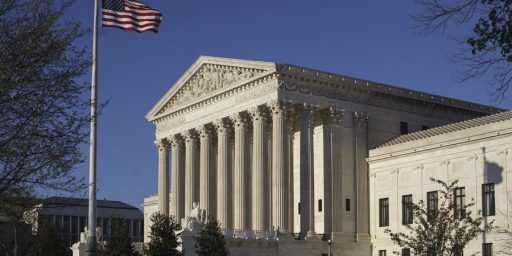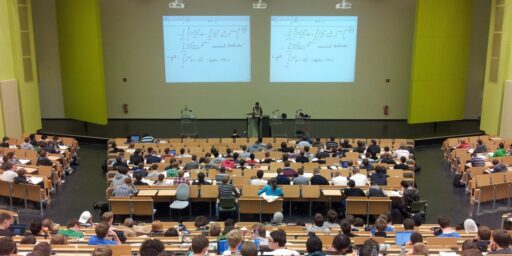LEGACY PREFERENCES
John Edwards has a rather odd editorial in USA Today.
In America, the kind of family you come from should never determine your destiny.
I agree in principle but find it divorced from reality. Unless the state confiscates all the babies and has them reared in communes, a policy which I oppose, I don’t see how to bring this to fruition. If your parents are highly educated, interested in the world around them, make a good living, and associate with similar people, you’re going to have a markedly different childhood than someone growing up in an environment absent those things. Even aside from class and economic issues, children that grow up with two loving parents are going to have a different set of experiences that those in an abusive home or one with estranged parents.
My parents worked in mills and did not have much money. But because of their hard work and good public schools, I was able to become the first person in my family to go to college. I’ve lived a life I never dreamed that I’d have.
All children in America should have the same opportunities — wherever they come from or whatever their backgrounds. As Americans, we have a responsibility to break down all of the barriers that stand in the way of that ideal.
So, what public policy change should we enact to make the incidence of hard working parents and good public schools more likely?
One of those barriers is some colleges’ practice of rewarding applicants because their parents went there. These “legacy” preferences don’t reward kids based on what they’ve accomplished. They don’t encourage diversity in the classroom or address discrimination the way affirmative action does. Legacy preferences reward students who already had the most advantages to begin with.
I agree that legacy preferences have no place in public universities. But it’s unclear why they constitute a more substantial barrier to mill workers’ kids than affirmative action programs, just given the numbers involved.
Ending legacy preferences would do virtually nothing to increase the likelihood that more John Edwardses will emerge. How many bright kids with poor parents are denied admission to public universities because some rich kid took their place? The number would have to be quite small. But how many kids with high IQs are hindered by coming from broken homes, parents that don’t encourage success, or other inhospitable environments? And how many of them are trapped in lousy public schools? I grant that there’s not a lot that the federal government can do about those things but, then, the admissions practices of schools are rather unrelated to the presidency, either.






It’s very unlikely indeed that they present more of a hindrance to working class kids getting into college than affirmative action. Not when middle class minority applicants with all the ‘advantages’ Edwards wants to spread around more evenly get an extra boost in admission that the child of poor whites (of whom there are some 27 million in the USA) won’t get merely because of the colour of their skin.
How often that happens is difficult to quantify but, as you say, given the numbers involved, it’s unlikely to be less often than “legacy” promotions. In any event, there is an argument in favour of legacies even at public schools. Good colleges are not factories. Each strives to have a distinct, individual character. Part of the “culture” of a college is the sense of continuity that comes from educating the children of its alumni. Further, it is alumni who are most likely to support even a public college financially, which support provides millions of dollars to the school that do not have to be expropriated from the taxpayers. The possibility that their children and grandchildren will get a small preference in admission surely forms at least part of the motiviation to provide such support.
Reasonable people can disagree on whether or not such factors outweigh the public function of taxpayer-supported schools (I’m not sure they do myself), but the trendy new argument that legacy admissions are “unfair” is annoying in its apparent insistence that the practice has no redeeming features whatsoever.
I’d be more impressed by Edwards is he supported affirmative action for the lower income students and did away with affirmative action that is race based. (African-Americans, who are disproportionately poor, would benefit either way.)
He could even invoke being a mill worker’s son in the process.
Are there any real statistics that say qualified applicants are being turned away from colleges in general? It seems to me that this is more an argument about getting into the right school than getting into any school. But I would suggest Edwards could look at other admissions criteria before legacies. Indeed, Clemson in S.C. (and many other schools, I’m sure) have quotas for the number of out-of-state students they must admit each fall. There are more pissed off parents in Carolina whose kids don’t get to go to Tiger Paw Tech because of out-of-state students than because of legacies.
In fact, at many Ivy League universities (and I presume many universities – although I don’t know), there are more legacy admits than african american admits, despite your claim to the contrary. At Dartmouth for example, where I went. The class of 2000 had more than 8% legacy admits while less than 5% african american admits. I know that legacy admits are higher at places like princeton, probably lower elswhere.
Just to give you a sense of the numbers there were 1,085 admits to the class of 2000 at Dartmouth. 4.7% african american means 50 african americans. It is always interesting to me that the right expends all this energy scrutinizing the admissions policies relating to such a small segment of the population. Doing so, of course, allows them to shift discussion away from how the educational alternatives of a large segment of the population can be improved. And it also gives that large, dissafected segment (their base), a convenient outlet for their frustrations, and delays the realization that in fact their political patrons have done nothing for them.
Do those numbers represent merely the actual population of legacies and African-Americans, or those admitted who would not have qualified under competitive admissions?
See the following: Dartmouth Class of 2000
Those figures represent total admits to the class. There are give or take 5% african american per year and 10% or so legacies in each class.
David,
Thanks.
Given the demographics, is that surprising? One would think that teenagers whose parents went to Dartmouth would be rather more likely to get accepted to Dartmouth. They’re genetically and environmentally disposed to having an above-average IQ, are likelier for a variety of reasons to score higher on the SATs, to have gone to prep school, etc. Conversely, African Americans in the aggregate are poorer, less likely to have gone to decent schools,less likely to be surrounded by good books, and all that. So, the mere presence of legacies in large numbers isn’t problematic unless there’s some evidence that they’re displacing more qualified applicants.
Now, the demographic trends cited above may constitute the best argument for affirmative action programs. My preference, however, would be to target the preferences to the disadvantaged individual rather than the aggregate. I’ve got no problem with a preference program that would have the effect of
giving a disproportionate boost to African Americans and Hispanics, but that’s based on economic, community, or other variables tied to the individual.